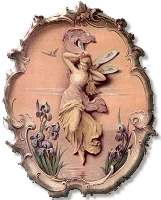
• Esther Hobart Slack Morris (1814-1902) ... she held a tea party in Wyoming presenting issues & concerns to men regarding women voting
From the Wyoming State Archives:
Mrs. Morris has been widely acclaimed as an influential figure in the events that established women’s suffrage in Wyoming. However, her role in promoting suffrage legislation in the territory has been disputed. The record shows that in 1869, during the territory’s first legislative session, William H. Bright introduced a women’s suffrage bill. Although the legislation was received with some humor, it did pass and was signed into law by Governor John A. Campbell, thus according the young territory immediate fame as the first government to grant women the right to vote in all public elections.
Shortly after the legislative session, in February 1870, Wyoming achieved another “first” when three women were appointed to serve as justices of the peace. Esther Morris was selected to complete the term of the South Pass City justice, who had resigned. She is the only one of the three appointees known to have served, thereby winning accord as the first woman to hold a judicial position. Mrs. Morris served 8½ months and handled 26 cases in a manner that was considered a credit to her position. In later years, following first separation from then death of her husband, Ms. Morris lived with her sons. She appeared at a number of women’s rights gatherings and political affairs, though she was apparently not comfortable with making speeches. She died in 1902 in Cheyenne, Wyoming.
Mrs. Morris eventually became a symbol for the women’s rights movement, and stories of her independent attitudes and support of women’s issues have been circulated. As for the question of who was the main force behind the Women’s Suffrage Act in Wyoming, the verifiable record favors William H. Bright, who introduced the bill. A story that Mrs. Morris had obtained a promise from Bright, also a South Pass City resident, at a tea party to introduce the suffrage bill surfaced decades after the fact and has been commonly repeated. Though this story and any direct involvement by Mrs. Morris in the drafting and introduction of the suffrage bill cannot be substantiated, Esther Morris is commonly regarded as one of the heroines of the women’s suffrage movement. Her name became synonymous with equal rights, fame which led to her being chosen as Wyoming’s representative in Statuary Hall in the Capitol Building in Washington, D.C. Her statue was presented in ceremonies at the Capitol in 1960.



